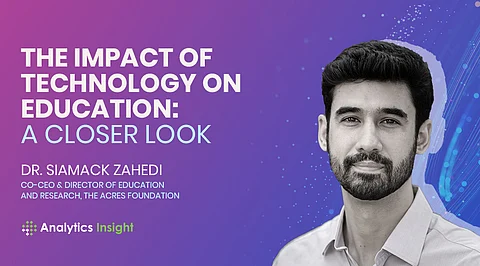
- Insights
- Cryptocurrencies
- Gadgets
- Stocks
- White Papers
- Reports
- Industry
- Geography
- Insights
- Cryptocurrencies
- Gadgets
- Stocks
- White Papers
- Reports
- Industry
- Geography


Technology has had a significant positive impact on education in recent years. With the proliferation of the internet and the widespread adoption of devices such as laptops, tablets, and smartphones, students and teachers now have access to a wealth of information and resources that were previously unavailable. One major benefit of technology in education is the ability for students to access information and resources anytime, anywhere. With the internet at their fingertips, students can now easily find the answers to their questions and complete assignments from the comfort of their own homes. This flexibility allows students to learn at their own pace and gives them the freedom to choose when and where they learn. Another positive impact of technology on education is the ability to personalize learning. With the use of adaptive learning software, teachers can now create customized lesson plans and assignments based on the individual needs and abilities of their students. This personalized approach to education can help students feel more engaged and motivated to learn, as they are able to focus on the topics and skills that are most relevant to their needs. Technology has also made it easier for teachers to collaborate and share resources with their colleagues. Through the use of online platforms and social media, teachers can connect with each other and share lesson plans, activities, and other teaching materials. This collaboration helps teachers stay up-to-date on the latest teaching techniques and can also save them time and effort when it comes to creating their own lesson plans.
In addition to these benefits, technology has also made it possible for students to learn from a wider range of sources. With the internet, students can now access lectures, videos, and other educational materials from some of the world's top experts and institutions. This allows students to learn from a diverse range of perspectives and experiences, which can broaden their understanding and appreciation of different subjects. Finally, technology has also made it easier for students with disabilities to participate in the classroom. With the use of assistive technologies such as text-to-speech software and electronic magnifiers, students with vision or hearing impairments can now easily access and participate in class discussions and activities. Overall, the positive impact of technology on education is undeniable. From increased flexibility and personalized learning to the ability to collaborate and access a wide range of resources, technology has transformed the way we learn and has opened up new possibilities for students and teachers alike.
Before I move on to make my main point, I would like to ask you what you think of the paragraphs that you have read thus far. Are they clear? Do they make a coherent argument? If you answered "yes" then you will be as surprised as I am sure that it was written entirely by the free online chat program by OpenAI's GPT-3. I simply typed the command "write a 500-word essay on the positive impact of technology on education", and it generated those paragraphs automatically in about a minute! I ran the essay through an online free plagiarism check software and it showed the content to be 100% unique! What do such advancements in technology mean for the field of education? For one, it forces us to review the prioritization of our current schooling goals. Should we continue spending the majority of school time on learning mechanical skills like handwriting that are essentially redundant in a world where collaboration and communication are almost entirely tech-driven? Should it continue to be learning a vast disconnected set of facts about the world and lower-order procedural thinking skills that can be more efficiently and effectively done by a growing market of artificial intelligence programs? The Brookings Universal Centre for Education predicts that a substantial percentage of jobs that schooling is preparing students for today will be redundant by the time they complete school. Our world has been steadily reorganizing from an industrial economy to a knowledge economy, but has schooling responded to this change? How then should we best invest the precious and limited time that students have at school? Of course, we should spend some time teaching foundational academics, but this can no longer be treated as an END in the learning journey at school. Instead, such knowledge and skills should be treated as a MEANS or tools that students are trained to utilize and apply towards developing competencies that actually matter for their success in the 21st century, which as per the Ministry of Education's Innovation Cell includes "creativity, innovation, empathy, problem-solving, teamwork, strategic thinking, entrepreneurship as well as learning to accept failures as a part of one's development process". Instead of teaching students to compete with AI, we should teach them to leverage the capabilities of AI and redirect their cognitive bandwidth more strategically towards the highest-order thinking processes and creative problem-solving that is only capable by the human mind.
Disclaimer: Analytics Insight does not provide financial advice or guidance. Also note that the cryptocurrencies mentioned/listed on the website could potentially be scams, i.e. designed to induce you to invest financial resources that may be lost forever and not be recoverable once investments are made. You are responsible for conducting your own research (DYOR) before making any investments. Read more here.
